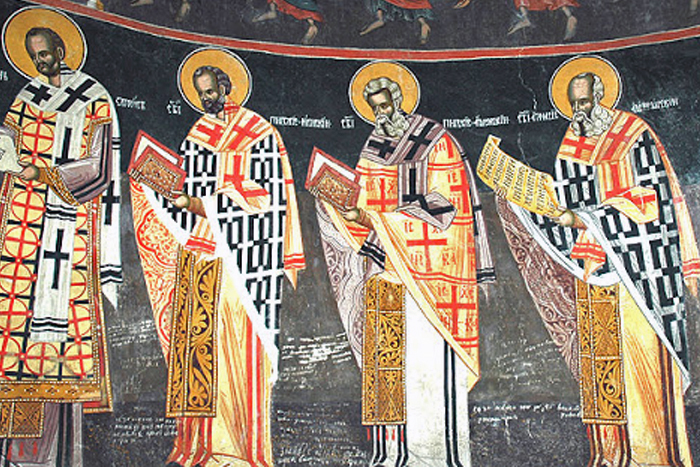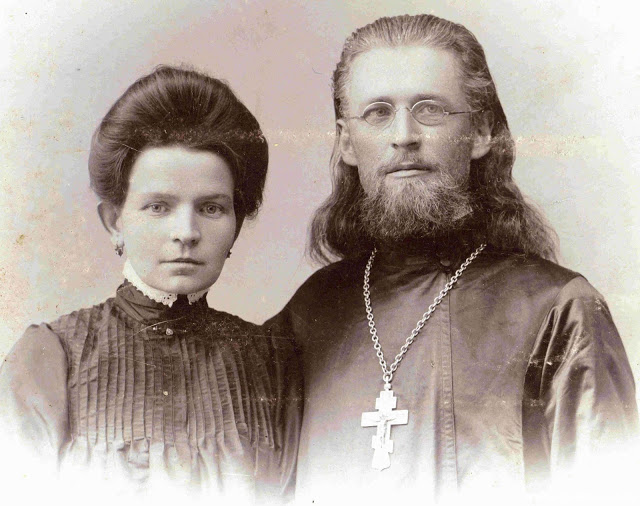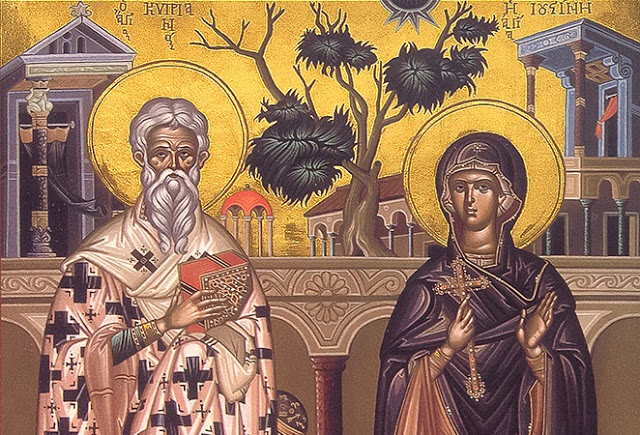
We Orthodox are fond of referring to the Church Fathers as authorities within the Church. When faced with a new or controversial issue, an Evangelical Protestant will ask, “What does the Bible say?” A classic Roman Catholic will ask, “What has Rome said?” An Orthodox will respond, “What do the Fathers say?” By this one can correctly conclude that the Fathers function as authorities in the Orthodox Church.
That said, we must still examine in exactly what way the Fathers function as authorities. This is not a straightforward or easy as it may first appear. The very use of the term “the Fathers” may lead the unwary to think that “the Fathers” were all carbon copies one of another, that they all marched in a kind of exegetical lock-step, and that there existed an untroubled unanimity of viewpoint and opinion among them. One might perhaps imagine that the Fathers are authoritative because they were so holy that each one had a hotline to heaven, and that the Holy Spirit within them bestowed an immunity from making mistakes and a supernatural insight not granted to us lesser mortals. If one adopts this view of the Fathers and believes that their authority was rooted in their personal closeness to God, one will be surprised when reading Church history. For there one will discover that the Fathers could be subject to personal weaknesses and sins rather like the rest of us, and that they often disagreed and even quarrelled with each other.
One does not need to read very much church history to confirm this. St. Augustine and St. Jerome, for example, conducted a very public exegetical quarrel about the meaning of Paul’s rebuke of Peter at Antioch mentioned by Paul in Galatians 2:11. St. Jerome (whom no one ever accused of being easy-going) famously quarrelled with his friend Rufinus over the theology of Origen so vociferously that it became a public scandal. St. Epiphanius and St. John Chrysostom found themselves at personal loggerheads in Constantinople to the point where they heartily detested each other. Nobody bats a thoushiand, not even the Fathers. None of this should be taken as a denial that the Fathers were holy. But holiness is found in real people, and the Fathers were real people. As such, they could make mistakes and sometimes find reasons for repentance.
So, what does the fact that the Fathers were real people mean regarding their authority in the Church? In what does their authority consist and where does it reside? First of all, let us examine two places where their authority does not reside.
Their authority does not reside in the details and minutiae of their Biblical interpretation. We are not, therefore, bound by all of their exegetical conclusions, and our task as exegetes today is not to simply parrot and reproduce what the Fathers wrote. Indeed, we could not do so even if we wanted to, for in their detailed exegesis of Biblical passages they often disagreed with one another. This is not surprising, since we are talking about the exegesis of thousands of verses done by men of different abilities, living in different countries, and writing in different centuries. Given this immense army of exegetes and preachers, it is hardly surprising that they disagreed about the details of exegesis.
And it is not as if the Holy Spirit fell asleep after the death of St. John of Damascus (often hailed as the last of the Fathers) and ceased to guide and illumine devout Christians in their examination of the sacred text. If the Spirit is still active in the Church we may expect a growth in our understanding of the sacred text, especially as new tools are placed in our hands—tools, for example, like a knowledge of Hebrew and literary artefacts of the Ancient Near East. There is a true and godly ministry of scholarship which differs from the merely destructive liberalism sometimes found in some universities, and the insights of these godly scholars should not be disdained. To reject these insights because they cannot be found in the days prior to St. John of Damascus is folly—a folly the Fathers would be the first to decry. Fidelity to the Fathers’ love of the Scriptures should lead us to embrace the insights of true scholarship if these help us to better understand the Scriptures.
Secondly, the authority of the Fathers does not reside in the details of their cosmology or their scientific worldview. The Fathers, being real people, accepted the scientific insights and cosmology of their day. How could they have done otherwise? Therefore they believed in a geocentric universe, and that the sun revolved around the earth. St. John of Damascus, for example, taught that the sun, moon, and stars, after they had set, moved from the west to the north and then to the east; that there were seven planets (of which the sun and moon were two), and that these moved from west to east though the heavens in which they were set moved from east to west (Expos. 2:6, 7). He also taught that there were waters above the sky, and that God placed them there to shield the earth from the burning heat of the sun and the ether (Expos. 2:9). St. Basil in his Hexameron taught that flying insects, grasshoppers, and mice were produced by rainfall, which accounted for the multitude of mice in Egypt after a heavy rainfall, and that eels did not come from parent eels, but from the mud (Hex. 9:2)
None of this is scientifically true, but that is irrelevant to the question of the Fathers’ authority, including the authority of St. John of Damascus and St. Basil. They taught what they knew, including what turned out to be a scientifically erroneous cosmology. But our fidelity to the Fathers does not mean that we are bound by the limits of their scientific knowledge. Where science confidently leads to other conclusions, we may follow.
In what then does the Fathers’ authority consist? In their understanding of Christian theology and their teaching of the basics of doctrine. The apostles handed down orally and in writing the basics of the Faith—things such as the nature of God, the deity of Jesus, the plight of mankind, God’s provision for our plight in His Son, the place of Israel in His dealings with men, and how His people should live so as to please Him. It included things like the nature of sin, order in the Church, the meaning of baptism and the Eucharist, and authority of the Old Testament Scriptures, and how Christians should worship and live. It even included such things as facing east in prayer and making the Sign of the Cross. These things were handed down by tradition in the Church, and the consensus of the Fathers across the miles and the centuries regarding these things reflects and reveals the fact that they were handed down to the Church by the apostles themselves. How else to explain such an impressive consensus among men who otherwise held such diverse opinions? This is what is meant by the consensus patrum.
We value this consensus patrum therefore because it witnesses to the faith delivered to us by the apostles, and it is the apostles who are the ultimate human authorities in the Church. In the Creed we do not confess “one, holy, catholic, and patristic Church”, but “one, holy, catholic, and apostolic Church”. The Fathers are not authorities in themselves, but are authorities because and insofar as their consensus reveals the teaching of the apostles—as they themselves confessed. Their authority lies in their witness to the apostles’ teaching and in their faithful transmission of this teaching. The Fathers are not the sources of the Church’s teaching, but its faithful guardians, witnesses, and transmitters. We are not free to dissent from the Fathers, because we are not free to dissent from the apostles and still identify ourselves as the apostolic Church.
We must be clear, therefore, and realize to what the consensus patrum refers. It does not refer to everything on which the Fathers agreed, for they all agreed that the sun revolved around the earth, and a geocentric universe is not a part of the consensus patrum. Rather, the term refers exclusively to the Fathers’ agreement in matters of basic doctrine and theology. Insisting that we adhere to their opinions in all matters of science and exegesis is to misunderstand and misapply the authority of the Fathers. We are faithful to their spirit and φρονεμα, to their love for Christ, to their veneration for the authority of the Scriptures, and to their rule of faith, for these things they received from the apostles. In lesser things (such comparative trivialities as science and exegesis) we are free to learn from others and follow elsewhere.
Source: https://blogs.ancientfaith.com/nootherfoundation/the-authority-of-the-fathers/



